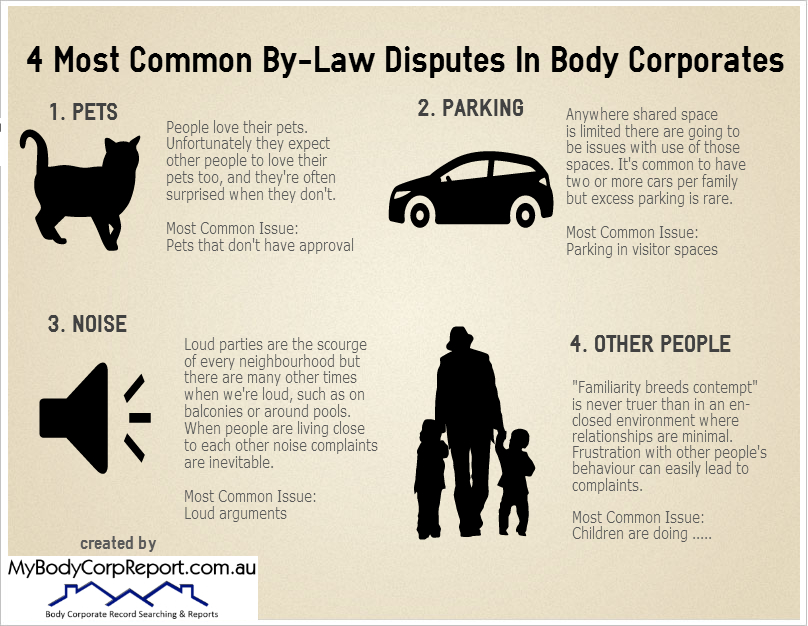 One of the key strengths of body corporates is the ability to build a community, a place where people feel safe, connected and involved.
One of the key strengths of body corporates is the ability to build a community, a place where people feel safe, connected and involved.
Communities are all about people. And therein lies the problem.
We all know people we like, and those we don’t, people we respect and people who just flat out make us want to do something crazy. People can be, and often are, the best and the worst of any situation.
And never more so than when they’re at home, which of course is particularly relevant to body corporates. Especially since body corporates actually have a lot more people involved than simply the lot owners.
This article is about exploring who these groups of people are, how they interact with the body corporate and the common disputes that arise.
Key Stakeholders In Body Corporates
Not all body corporates are the same. Some are very large, and others are very small, and consequently they have very different needs. That said, the way these body corporates run are actually very similar.
The majority of body corporate have, or at least should have, three key groups:
- The lot owners*
- The residents*
- The committee
*Not all residents are lot owners, although they certainly may be, however some residents may be tenants.
Larger body corporates will hire contractors to help with the management process; they are:
- The body corporate manager (BCM)
- The building manager or onsite manager
These are the key stakeholders in body corporates. Other people such as tradesman, visitors and property professionals will also interact with the body corporate on a regular basis.
Where Does The Power Lie?
It often may seem the BCM is in charge of the body corporate but that is actually a myth. The BCM is a business hired to undertake certain functions of the committee. Because they answer the phone and handle queries it may seem they have control.
They do not.
The collective lot owners run the body corporate. They decide major decisions at general meetings. One decision they make is to appoint a committee to handle day to day running of the body corporate.
The committee instructs the BCM, and the building manager if there is one, all of course within the context of legislation and specific contracts of appointment.
The lot owners, the committee, the BCM and the building manager all play a part in the running of the body corporate. Tenants by contrast have very little influence.
Common Body Corporate Disputes
Because there are so many different people interacting with a body corporate at any given point in time disputes do arise. They can take all sorts of forms from internal conflicts to payment disputes to criminal actions. If you can think it some people somewhere are probably arguing about it.
Let’s look at it this way. From a lot owners’ perspective, who are the people you’re most likely to argue with?
#1 Most Likely Argument is with the Body Corporate Manager (BCM)
The most common argument in body corporates is about levies.
Surprisingly it’s not often how much the levies are. It’s levy arrears that are a problem and legal action to collect overdue levies is the most common dispute in body corporates.
And that’s where the BCM comes in. The BCM issue levy notices and collect payments. They also chase up overdue levies, negotiate payments and, when directed to do so by the body corporate, charge interest and collection fees to lot owner accounts.
The second most common dispute in body corporates is about the amount of collection costs.
Actually arguments with the BCM are really pointless. Managers get a lot of abuse on this subject when they’re only doing their job carrying out the wishes of the body corporate.
#2 Most Likely Argument is with The Building Manager
In most body corporates a specific task allocated to the building manager via the Caretaking Agreement is to enforce by-laws. The task is eminently suited to the building manager since they usually live on site.
Sad as it may sound building managers actually do spend their time, part of it anyway, watching for by-law infractions. When they’re spotted a ‘quiet chat’ usually results.
Of course some people take very unkindly to being policed and disputes with the building manager arise.
I don’t mean to make it sound like the building manager is just lurking in the bushes waiting for an opportunity to jump out and gleefully denounce wrongdoers. In most cases building managers are seeking to maintain even handed observation of by-laws for the good of all.
They may also be co-opted to take sides in the next argument.
#3 Most Likely Argument is with Other Residents
Like night follows day neighbours argue. That’s because neighbours are really annoying. They have that stupid dog that barks consistently and have outrageously loud parties. Well, OK, maybe that’s just my neighbours but you get the picture.
In a body corporate neighbours are closer and they’re sharing resources and infrastructure. It’s an enclosed environment and it breeds conflict.
Ironically that’s why there are so many by-laws governing behaviour and an onsite person to mediate and police.
#4 Most Likely Argument is with The Committee
Disputes with the committee are more serious.
I don’t mean to diminish the importance of levy issues or by-law breaches, rather note the committee getting involved is usually a precursor to legal action, either through the courts or the Office Commissioner Body Corporates.
Other than attempting to enforce by-law breaches and levy disputes the committee may also get into disputes regarding:
- Problems with the building manager, usually in terms of non-compliance with terms of the Caretaking and / or Letting agreement
- Problems with the body corporate manager, usually in terms of unhappiness with some aspect of their service
- Disputes with lot owners regarding changes to lots
- Disputes with service providers regarding inadequate provision of service or overcharging
Committee disputes have more impact because the committee have the power to act and speak on behalf of the body corporate as a whole, consequently a dispute with the committee will eventually impact all lot owners.
What Investors Need To Check For
As with every area where body corporates develop problems what investors need to look for are the outliers, the really major problems that are best avoided. Things like:
- major legal action
- public liability claims
- criminal or destructive behaviour of residents
- committees fighting amongst themselves
- committees or lot owners engaging in frivolous legal action
As with all major indicators each investor needs to access all the facts of the particular situation and make decision with reference to their circumstances.
Generally speaking a history of disputes, or even on-going disputes is not a real problem. In fact as a decision making tool, a history of well dealt with disputes is a good measure of the effectiveness of the various stakeholders and their ability to manage the body corporate.
Equally, a history of poor management of body corporate disputes, or ongoing problems has its own story to tell.
Have anything to add? I’d love to know of your experiences of body corporate disputes so please, do leave a comment.
 Unless stated otherwise all the information on this website relates to Queensland legislation.
Unless stated otherwise all the information on this website relates to Queensland legislation.